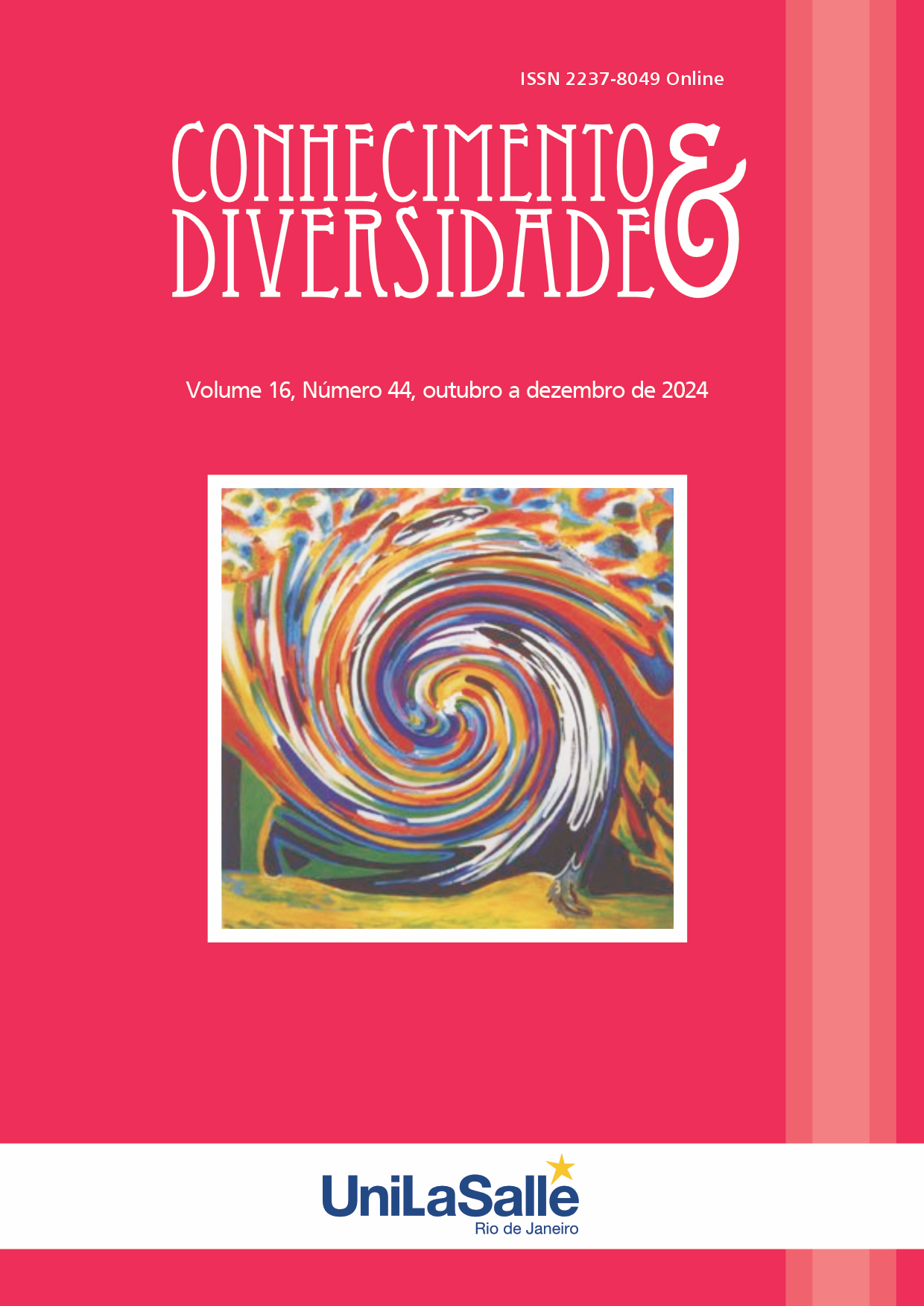INVESTIGANDO AS CRENÇAS E A COMPETÊNCIA DOS PROFESSORES DE EFL EM PRÉ-SERVIÇO RELATIVAMENTE AO ENSINO DA PRONÚNCIA
DOI:
https://doi.org/10.18316/rcd.v16i44.12083Palavras-chave:
Pronúncia, Crenças dos professores, Pré-serviço, Auto-eficáciaResumo
Este estudo procurou explorar as crenças dos professores de inglês sénior em pré-serviço sobre o ensino da pronúncia em inglês e as suas crenças sobre a sua competência relativamente ao ensino da pronúncia em inglês. Os participantes foram 17 professores de inglês sénior em pré-serviço que estudam numa universidade estatal. Para obter dados, foi utilizada uma versão modificada do questionário desenvolvido por Szyszka (2016). Enquanto a estatística descritiva foi utilizada para analisar os dados quantitativos, a análise de conteúdo foi utilizada para analisar os dados qualitativos. Os resultados revelaram que a maioria dos participantes tinha atitudes positivas em relação ao ensino da pronúncia e se considerava adequada para ensinar a pronúncia do inglês. No entanto, contrariamente às suas convicções, afirmaram não possuir os conhecimentos metodológicos necessários para ensinar a pronúncia inglesa devido à sua formação insuficiente.
Referências
Aksakallı, C., & Yağız, O. (2020). The Pre-service EFL teachers’ development of phonological processing and evaluation of their attitudes toward pronunciation. Gist Education and Learning Research Journal, 7–31.https://eric.ed.gov/?id=EJ1262538
Aksakallı, C., & Yağız, O. (2021). A qualitative investigation into EFL pre-service teacher’s attitudes towards English pronunciation and the evaluation of their phonological awareness, problems and difficulties. Bingöl Üniversitesi Sosyal Bilimler Enstitüsü Dergisi, 21, 87–106. https://doi.org/10.29029/busbed.816899
Alcuma, Z. (2021). Investigating EFL Teachers’ beliefs and practices regarding pronunciation teaching: Di̇yarbakir case. (Unpublished Master Thesis). Gaziantep University, Türkiye. https://tez.yok.gov.tr/UlusalTezMerkezi/tezSorguSonucYeni.jsp.
Al-Fakhri, F.Kh.A.K. (2003). The production of the voiced and voiceless dental fricatives /ө/ and/ð/ by Arabic speakers of English from Libyan background: A case study Libyan students in USM. Unpublished Master Thesis. University Science Malaysia
Aslan, S. (2021). A study on EFL teachers’ beliefs and practices regarding Pronunciation teaching at state school in Hatay. (Unpublished Master Thesis). Çağ University, Türkiye.
Bai, B., & Yuan, R. (2018). EFL teachers’ beliefs and practices about pronunciation teaching. ELT Journal, 73(2), 134–143. https://doi.org/doi.org/10.1093/elt/ccy040
Berg, B. L. (2001). Qualitative research methods for the social sciences. Allyn and Bacon.
Bodorik, M. (2017). Teaching English pronunciation by non-native teachers as seen by Slovak teachers. Journal of Language and Cultural Education, 157–174. https://doi.org/10.1515/jolace-2017-0034
Buss, L. (2016). Beliefs and practices of Brazilian EFL teachers regarding pronunciation. Language Teaching Research, 20, 619-637. https://doi.org/10.1177/1362168815574145
Buss, L. (2017). The role of training in shaping pre-service teacher cognition related to L2 pronunciation. Ilha Do Desterro A Journal of English Language Literatures in English and Cultural Studies, 201–226. https://doi.org/10.5007/2175-8026.2017v70n3p201
Chau, T., Huensch, A., Hoang, Y. K., & Chau, H. T. (2022). The effects of L2 pronunciation instruction on EFL learners’ intelligibility and fluency in spontaneous speech. TESL-EJ, 25(4). https://tesl-ej.org/wordpress/issues/volume25/ej100/ej100a7/
Coskun, A. (2011). Future English teachers’ attitudes towards EIL pronunciation. Journal of English as an International Language, 6(2), 46-68.
Couper, G. (2017). Teacher cognition of pronunciation teaching: Teachers' concerns and issues. TESOL Quarterly, 51, 820–843. https://doi.org/10.1002/tesq.354
Creswell, J. W., & Clark, V. L. P. (2007). Designing and conducting mixed methods research. Sage Publications.
Creswell, J. W. (2009). Research design: Qualitative, quantitative, and mixed method approaches (3rd edition). Sage.
Creswell, J. W. (2012). Educational research: Planning, conducting, and evaluating quantitative and qualitative research. 4th Edition. Pearson Education.
Derwing, T. M., & Munro, M. J. (2005). Second language accent and pronunciation teaching: A research-based approach. TESOL Quarterly, 39(1), 379–397.
Gilakjani, A. P., & Sabouri, N. B. (2016). Why is English pronunciation ignored by EFL teachers in their classes? International Journal of English Linguistics, 6, 195-208 https://doi.org/10.5539/ijel.v6n6p195
Gilbert, J. B. (2010). Pronunciation as an orphan: What can be done? TESOL SPLIS, 7(2), 1-5.
Harmer, J. (2007). The practical of English language teaching. 4th Edition. Pearson Longman.
Kuzborska, I. (2011). Links between teachers’ beliefs and practices and research on reading. Reading in a Foreign Language, 23(1), 102-128. https://www.researchgate.net/publication/268435005_Links_between_teachers'_beliefs_and_practices_and_research_on_reading#fullTextFileContent
Lim, S. (2016). Learning to teach intelligible Pronunciation for ASEAN English as a Lingua Franca: A sociocultural investigation of Cambodian pre-service teacher cognition and practice. RELC Journal, 47(3), 313–329. https://doi.org/10.1177/0033688216631176
Murphy, J. M. (1999). Oral communication in TESOL: Integrating speaking, listening, and pronunciation. TESOL QUARTERLY, 25(1), 51-75.
Nguyen, L. T. (2019). Vietnamese EFL learners’ pronunciation needs: A teaching and learning perspective. The TESOLANZ Journal, 27, 16–31. https://www.researchgate.net/publication/352550995_Vietnamese_EFL_learners'_pronunciation_needs_A_teaching_and_learning_perspective#fullTextFileContent
Nguyen, L. T., & Newton, J. (2020). Pronunciation teaching in tertiary EFL classes: Vietnamese teachers’ beliefs and practices. The Electronic Journal for English as a Second Language, 24, 1-20. http://www.tesl-ej.org/wordpress/issues/volume24/ej93/ej93a2/.
Nguyen, L. T., & Newton, J. (2021). Enhancing EFL teachers’ pronunciation pedagogy through professional learning: A Vietnamese case study. RELC Journal, 52(1), 77-93. https://doi.org/10.1177/0033688220952476
Öztürk, G. & Gürbüz, N. (2014). Speaking anxiety among Turkish EFL learners: The case at a state university. Journal of Language and Linguistic Studies, 10(1), 1-17
Sugimoto, J. and Uchida, Y. (2016). A variety of English accents used in teaching materials targeting Japanese learners. ISAPh 2016 International Symposium on Applied Phonetics. https://www.isca-archive.org/isaph_2016/sugimoto16_isaph.html
Szyszka, M. (2016). English pronunciation teaching at different educational levels: Insight into teachers’ perceptions and actions. Research in Language, 2, 165-180 https://doi.org/10.1515/rela-2016-0007
Yağız, O. (2018). EFL language teachers’ cognition and observed classroom practices about l2 pronunciation: The context of Turkey. Novitas-ROYAL (Research on Youth and Language), 187-204. https://novitasroyal.org/download/efl-language-teachers-cognitions-and-observed-classroom-practices-about-l2-pronunciation-the-context-of-turkey/
Yenkimaleki, M., van Heuven, V. J., & Afshar, H. S. (2020). The Efficacy of segmental/suprasegmental vs. holistic pronunciation instruction on the development of listening comprehension skills by EFL learners. The Language Learning Journal, 51(6), 734-748. https://doi.org/10.1080/09571736.2022.2073382
Downloads
Publicado
Edição
Seção
Licença
Copyright (c) 2024 Meral Çapar

Este trabalho está licenciado sob uma licença Creative Commons Attribution 4.0 International License.
Conforme recomendado pelo o Public Knowledge Project, a RCD adota para seus artigos uma licença CREATIVE COMMONS: Atribuição CC BY 4.0.
Esta licença permite que outros distribuam, remixem, adaptem e construam sobre o seu trabalho, mesmo comercialmente, desde que lhe dêem crédito pela criação original.
Esta é a licença mais adequada oferecida.
Recomendado para a máxima divulgação e uso de materiais licenciados.



